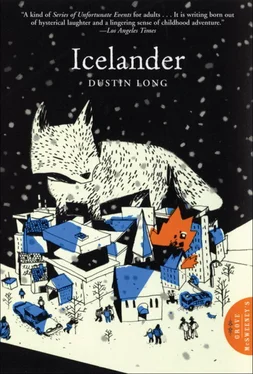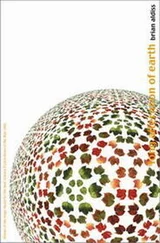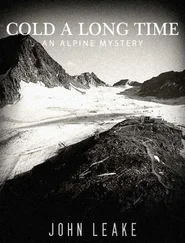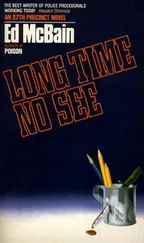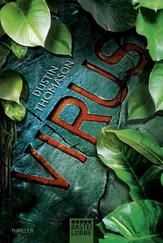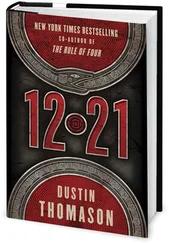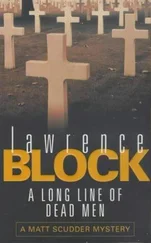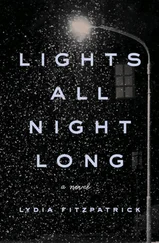“We see. Though no one would find it a sufficient insult to commit murder over, we trust.”
“Oh, of course not. It was just a hypothetical reconstruction, after all… But I don’t suppose we should really be hanging about here without him like this, now, should we? So, shall we leave?”
“Feel free.” We escorted him to the door. “But we shall linger for a time.”
“Hmph. Well, if you require any further assistance with the investigation—”
“You have assisted us enough,” we told him.
He hesitated at the door, but stepped finally across the threshold when Mr. Pacheco harrumphed with peculiar zeal. We locked the door behind him before he could say anything further, then, and we turned to resume our search.
NATHAN
The son hesitated a moment and cast a glance at his father as he considered my request to be allowed inside the temple.
“It is a sacred place to the Refurserkir,” he said. “Only a few outsiders have ever seen its inner chambers.”
“Well, maybe I could just see its outer chambers.”
He said something to his father, who paused before nodding.
“We will see what we can do,” the son told me. “My father apparently is fond of you.”
That was a little hard to believe, but I followed the two of them up to the entrance anyway. A middle-aged guard playing with a Swiss Army Knife and dressed in clothing similar to theirs stopped us as we approached. He spoke to the father while I just stood there admiring my shoes for fear of looking too lustingly at the doorway. I was down to my aglets when they stopped and the son finally spoke to me.
“My father wants you to know that he believes you to have the heart of a Refurserkur, or we would not be doing this. After much passionate niggling with the guard on your behalf, he has determined that you may enter. But the temple is in need of constant upkeep, and the guard has many children—”
“Okay, how much?” I asked.
“Sixty American dollars.”
I pulled out my wallet; there was eighty dollars left in it.
“All right, here you go.” I handed the money over. “But there better not be any other tourists in here who have the hearts of Refurserkir,” I mumbled, “or I’m gonna want my money back.”
BLAISE
Shirley always mumbled her meaning beneath shouts of misdirection. Like legerdemain, but sleight of words. By way of example, a representative salutation from one of her letters:
Lisp and stutter; bless your throat. My aim is true .
The first sentence is clear enough. It is a variation on one of her common greetings to me. Saint Blaise once prevented a man from choking to death on a fishbone and has since been regarded as the patron of healthy throats. “Bless” shares consonance with my name, which itself signifies a defect of speech, such as a stutter or particularly a lisp.
“Aim,” however, is more complex. Sensitive to my native language, she implies the truth of her love, though aimer indicates something more familial than the feelings of passion which we shared. “Adore” is the cognate that she should have sought, unless this “truth” was in reference to her love for someone other than me. Yet she was fond of stratifying her words with as many meanings as possible. “Aim” could also here mean simply “direction” or “purpose.” Perhaps, fully expanded, the sentence stands for something like “My purpose is noble and I mean not to misdirect you, only to express the purity of my love.” Unless I have missed the point entirely. Her text is rich with such ambiguities.
It is this morning and I have laid her journals aside. I must mull the ambiguities. I rub my eyelids with the corns of my palms, but my tear ducts are drained. Pots of coffee have not helped to maintain my store of fluids. I move somehow from the bedroom to the kitchen to brew another pot. Perhaps I should change to tea.
My wife is dead. Light shines into the kitchen from the snow outside and then reflects off of the knife-scratched metal of our countertops. Through the window I stare for a moment at the Two-Story House in our backyard. It was built shortly before Shirley’s departure to Denmark in the summer of 1998, though Shirley only finished the text after her return. The stories each had something to do with fish. I run the tap for a glass of water to replenish my fluids, but as the tumbler fills I realize that I am not thirsty for water after all. I am angry at my wife.
The percolator splutters its last liquid into the pot, and I pour some into the tumbler. It burns my hand to hold, but I am angry at myself for being angry at my wife. How can I be angry at her when she is dead? I believe that I know something of what happened while she was in Denmark. I sit in my chair at our small wooden table and place my coffee in front of me, attempting to drain it of heat with both of my hands. I do not use a coaster. Shirley would have been angry about this.
Sometimes I really want to XXXXXXXXXXXXXXXX .
There are words that I cannot reclaim. They are buried beneath overlayings of ink that press beyond their roots, almost through to the other side of the page; they remain unrevealed by the most fervent scratching of my fingernails. There are pages that have been carefully sliced away with razors, their erstwhile existence betrayed only by the twins of leaf from which they have been severed. But these muted words speak almost as volubly as her cryptic mutterings. They speak of something that even her usually sufficient literary obfuscations could not serve to hide.
I finish my coffee quickly. I am not tired, but I must ensure my wakefulness. Close reading is not to be the only aspect of my investigation. Through the window I see the snow falling to cover our backyard. His teeth were white as snow . It has fallen like this all through the night and morning. But the morning grows old, and I have agreed to meet Our Heroine at the Elite Café in less than an hour. Shirley met with her often after returning from Denmark. Supposedly for the purpose of mutual literary critique. My hope, however, is that Shirley shared details with her that could only be shared with another woman. I shall see.
OUR HEROINE
The park came into view at the end of the road as Connie led the way. A grove of birch cluttered the close edge, rising white and brown out of the ground like extensions of the dirty snow, but between the trunks sledders could be seen slogging up and sliding down the slope of the far end. Garm wasn’t evident anywhere in the area.
“Where is he?” I asked.
“This was where I saw him, down there, running right across the valley trough. I couldn’t even offer a guess of where he’s got to. It suddenly occurs to me, though… Do you suppose that the fire could have had anything to do with Shirley’s death? Perhaps the killer torched the library?”
“Now’s not the time, Connie.”
I held onto my father’s arm as we descended into the park’s bowl.
“I know this place,” he said as we approached the bottom. I should have taken him back to the house.
“That looks like the spot where I saw him.” Constance pointed to a vague trail of disturbed snow leading from near where we stood up to the edge of park that bordered downtown.
“Item,” she said, waving her hand in the air in front of her. “Not-so-famed pup of the Bean-Ymirson clan gone missing just days after death of close family friend. Is there a connection? If not, why does Our Heroine seem so much more preoccupied with finding said canine than with the brutal murder of—”
“Something can still be done about Garm, Connie. I can find him. I can’t save Shirley.”
“I’m not talking about saving her. I’m talking about showing some emotion over the death of your friend. Remember the lesson of QE2 and the death of Di. Public befuddled over Our Heroine’s apparent lack of concern.”
Читать дальше
